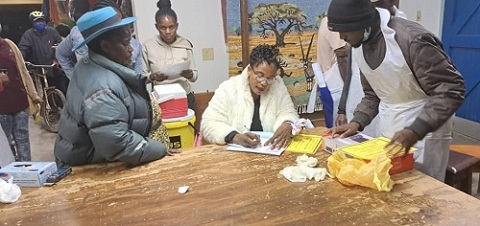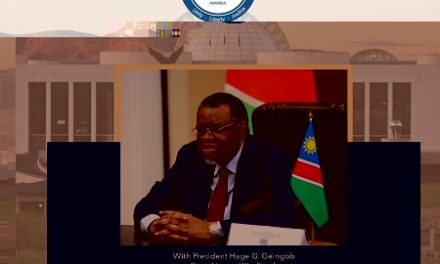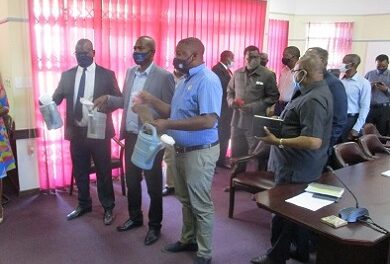
All people have dreams. But many people’s dreams never become a reality, not because they refuse to wake up and pursue their dreams, but mostly because in the modern world of today a lot more factors are seemingly against the dreams of those who are at the bottom of the socio-economic pyramid.
In 2023, despite challenges, Ms. Linea N.N. Haimbodi, chairperson of NCCI at Eenhana, embarked on a mission to empower unemployed women, emphasizing the importance of entrepreneurship for local and national development as a means towards the realisation of personal dreams.
Haimbodi, herself a self-willed social entrepreneur, advocates that deciding to become a business person is not daunting; the key is making decisions and taking actions that contribute to the nation’s progress.
Ms. Haimbodi emphasises the analogy of nurturing a child for success, correlating it with growing a business.
“The important thing is to take the decisions and to give yourself to the nation and the people of God so that you’re able to improve their livelihood and help them move from one level to the next,” she says of any aspiring entrepreneur.
“For example when a child is born and is raised well, and if the child listens and obeys, the fruits of his or her success will be eaten early just as when a tree is planted nearby a river. That also goes for business.”
“In the face of a perceived bad year, hard workers persevered, gaining money, knowledge, skills, and improving their lives,” she relates in retrospect of a year that was filled with activities intended at making people acquire skills enabling them to put bread on their tables.
Haimbodi, through her company Hanganeni Technology and Investment, provided training and skills to uplift individuals in low-income communities to higher levels.
As the Chairperson of NCCI, she draws on her experience to address unemployment issues. She stresses the need for individuals to take initiative rather than solely blaming the government for job opportunities.
In a six-month nationwide programme, Ms. Haimbodi trained over 2000 people from diverse backgrounds, promoting skills in soap making, baking, and other areas. Many participants started businesses or expanded existing ones, leading to visible impacts across the country.
She urges the nation to support local products, acknowledging that sometimes locally-made products may not be of high quality, but, she says “they are our products, quality improves with time when there is support from local people.”
Haimbodi also calls for support from leaders, businesses, and kind Samaritans for sponsorship and donations to sustain the training programme. She aims to instill a sense of achievement and self-sufficiency, emphasizing the importance of collective effort.
Ndafolako Samuel is one of the beneficiaries of the trainings conducted by Haimbodi. Hailing from Ondobe in the Ohangwena Region, Samuel expresses gratitude to those who aided her entrepreneurial journey, including governors, social workers, politicians, sponsors, and community members who supported the programme.
Specific leaders and business figures acknowledged for their exceptional contributions to the programme which took Haimbodi to various places, where she empowered others with business skills are:
- Hon. Councilor Susan Ndjaleka of the Nam#nus Constituency for her sponsorship,
- Hon. Councilor Taimi Kanyemba of Karasburg Constituency for her organisational involvement,
- Hon. Councilor Sebastiaan Ignatius of Khorixas Constituency in Kunene Region for organising his people,
- Hon. Councilors at Omulonga, Ongenga, Okongo and Eenhana Constituencies in Ohangwena Region for organising the communities and volunteers for the training,
- Business woman at Luderitz Melania Kambode for her sponsorship,
- SPWC Regional Coordinator at //Karas Region Shipila Shihepo for organising the activities in her region,
- Swapo Party District coordinator Jonathan Engelhardt for his sponsorship,
- Mr Ngoma Andrew with his team at Kavango East and West Region for being the organiser and supporting their communities.
- And others who provided various support to the programme.
The program’s success is also attributed to the National Broadcasting Corporation (NBC), which played a vital role in spreading information.
“I am immensely grateful for the support of everyone, it is reinforcing the principles of freedom to work and the resilience of the human spirit,” Haimbodi states, adding that her motto is: “Strongest people make time to help others, even if they are struggling with theirs”.
Other than providing practical skills in how to make soaps, biscuits, macaroni, perfume, jam, juice, mayonnaise, body lotion, fabric softener, pine gel, washing powder and many others at household level, the trainings also included imparting skills such as how the people can change their business dreams, how to transform your mind in the business, how to invest your mind in the business, and steps how to become a successful business person.
“It was not easy for me a single woman, traveling around the whole country in all 14 regions, day and night, for 6 months, where I trained people of all tribes, different cultures, beliefs and languages in our country but due to the fact that they are my fellow Namibians I wanted them to enjoy the fruit coming from different resources of our motherland,” Haimbodi says.
“I feel much honoured because most of the people who received the training started their businesses and many others expanded their business too, and some have gone on to train others and spread the skills. All these results are visible all over the country where you will find our products like soaps, perfumes and other different kinds being sold on the streets or in local stores.
“Many people are now managing to pay their children’s school fees and tuition fees.
“2023 was the year where I came to realise that many women and youths only need to be empowered in terms of business skills and entrepreneurial knowledge, and that is the best way to fight poverty in our communities,” she says.
“My desire is for this training programme to continue. Due to factors like unemployment a lot of youth and people at community level are blaming the government for lack of job opportunities, but they are doing nothing to help themselves.
“This issue is a national one and no one has the right answer on job creation but together with this program we can make a difference and be able to change the people’s living standards and empower them to face life successfully.”
Haimbodi encourages everyone who doesn’t know how to hustle for themselves and doesn’t know how to do something for themselves to join the training programme in 2024.
“This will save your money and cut off your daily expenditures,” she advises.
The year 2024, Haimbodi promises, will most likely have the nation see products made by beneficiaries of the programme all over the country displayed at business conferences and expo/trade fairs.
As such, Haimbodi says, she remains ready to hold hands with others on the journey towards achieving entrepreneurial dreams in 2024 and beyond.

In the photo: Linea Haimbodi with some beneficiaries of the training programme.







